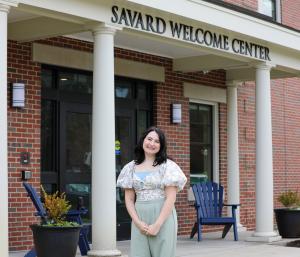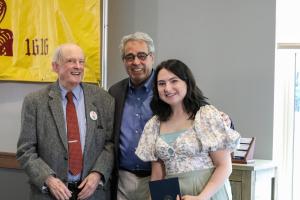Jillian Dorazio ’24 has been named the John S. Whipple Scholar for 18th Century Studies at Saint Anselm College. Joseph A. Favazza, Ph.D., college president, presented the award, which comes with a research stipend, during the annual Shakespeare Sonnet Reading on April 24, 2023. Dorazio’s proposal, “The Paradox of 18th Century Enlightenment: A History of Western Racism,” will look at the role that 18th Century Enlightenment rhetoric played in the development of racism and white supremacy in the West.

Dorazio is a Communication and History double major with a long-time interest in news and politics. She serves as a Kevin B. Harrington Student Ambassador to the New Hampshire Institute of Politics as well as an archival and social media intern for the New Hampshire Political Library. She is also a staff writer for the Saint Anselm Crier, the college’s student newspaper. After Dorazio’s advisor recommended the scholarship to her, and she spent time researching and narrowing down her topic.
“I mainly associated the eighteenth century with two distinct values our humanities program emphasizes during Conversatio: rhetoric and democracy,” explained Dorazio. “As a Communication major, I am especially interested in the subject of rhetorical theory and the persuasive power of our speech. As a simultaneous History major, I was excited by the prospect of studying this era, as I have always found it particularly interesting. It is from here that I started to gather ideas regarding the rhetoric of Enlightenment thinkers and their impact on informing our modern conceptions of Western democracy. However, there was a nagging curiosity to explore the rhetoric describing racially marginalized populations, who were ultimately an exception from Enlightenment philosophers’ ideas surrounding liberty and equality.”
Dean Mark Cronin and Professors Rebecca Crisafulli and Joe Spoerl served on the selection committee. After reviewing the applications, they selected Dorazio’s writing, “This is a focused, important, and timely project; one that’s both ambitious but manageable at the same time. We are looking forward to seeing how [Dorazio] develops this topic. Since so many of our institutions are founded on Enlightenment ideals of equality, what [she] finds out may not only lead us to rethink the 18th century but also features of our current state.”
Dorazio is hoping that this project furthers her understanding of rhetorical theory. Specifically, how certain strategies can persuade large audiences of people, manipulate public opinion, and have lasting effects within society, particularly in how it can be used to disparage marginalized populations.

John Whipple, a former postulant at Saint Anselm Abbey, established the John. S. Whipple Scholarship to honor his father, who nurtured a lifelong passion for the study of the 18th century, a time when he believed that so much important human thought and progress originated. Last summer Whipple was making an annual retreat at the monastery and picked up the summer issue of Portraits, the college’s alumni magazine, read about the Gregory Grappone ’04 Humanities Institute, and saw it as a potential home for a scholarship he had long hoped to establish. He worked with the Humanities Institute, the Office of College Advancement, and the Office of Financial Aid to come up with the criteria that would best honor his father’s memory.
“The Grappone Humanities Institute looks forward to having a successful Whipple Fellow in 18th Century Studies on board this fall as part of its growing mission and programming,” shared Gary Bouchard, executive director, Grappone Humanities Institute. “As we open and dedicate out new home this summer, we are deeply mindful of and grateful to people like John Whipple who have been inspired by Greg’s story, by his parents’ vision and generosity, and who have decided to follow their lead in bolstering the humanities at Saint Anselm and in our world.”
